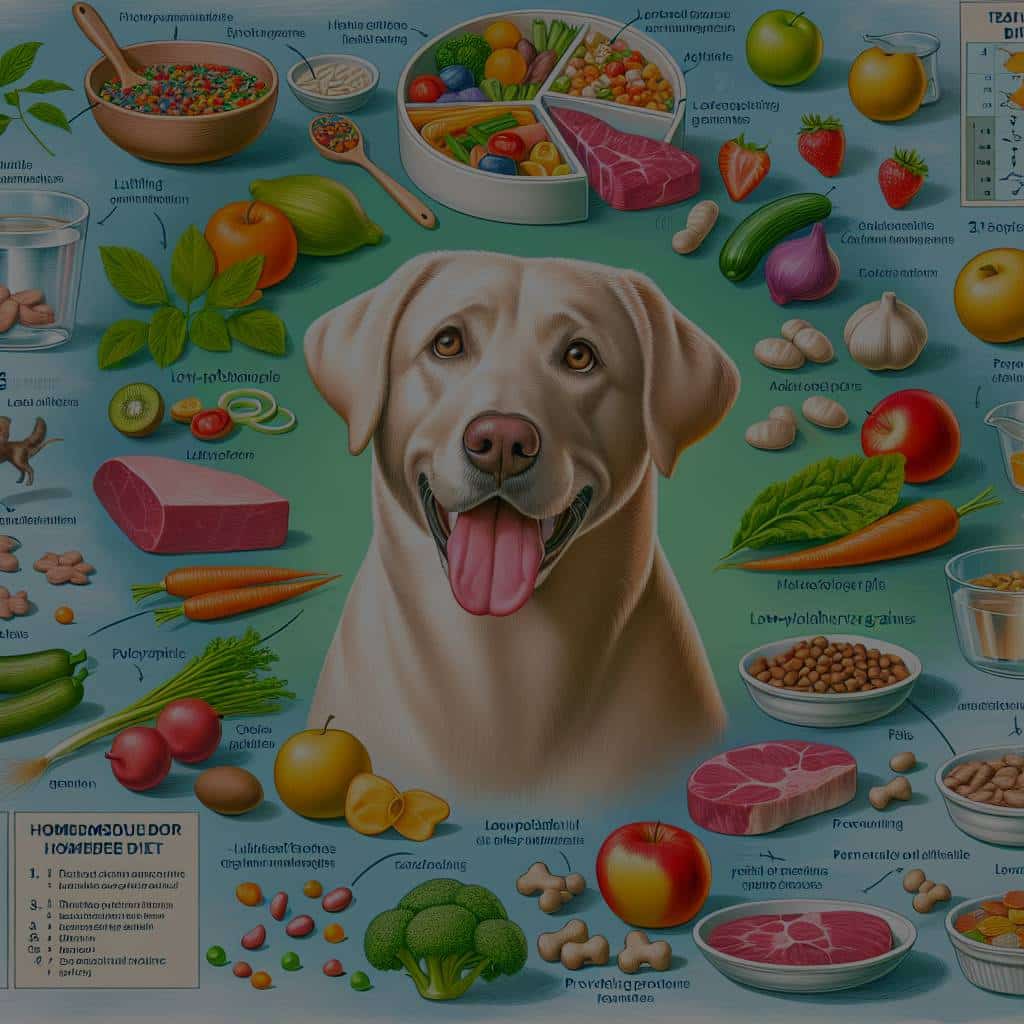How to Balance a Homemade Diet for a Dog Prone to Kidney Stones?

Feeding your dog a well-balanced diet is essential for maintaining their overall health. However, for dogs prone to kidney stones, their food choices need a bit more consideration. This article is designed to guide you on how to balance a homemade diet for your pet, focusing on preventing the formation of kidney stones. We will delve into what causes these stones, the role of calcium in your dog’s diet, and how water intake can affect this condition. We aim to provide a comprehensive guide on optimal food choices and the necessary adjustments in your pet’s diet. So, let’s get started.
Understanding Kidney Stones in Dogs
Before deciding what food to include in your dog’s diet, it’s important to understand what kidney stones are and how they affect your pet’s health. Kidney stones, also known as urinary stones or uroliths, are hard deposits formed from minerals and salts that build up in your dog’s urinary system. These stones can cause a lot of discomfort to your dog, obstructing the flow of urine and leading to serious health complications.
Avez-vous vu cela : How to Train Your Pet Guinea Pig to Do Simple Tricks?
The most common types of stones found in dogs are struvite and calcium oxalate stones. Struvite stones are often linked to urinary tract infections, while calcium oxalate stones are usually formed due to an excess of calcium in your pet’s diet. Diet plays a key role in the development of these stones, as certain foods can promote or prevent stone formation.
The Role of Calcium in Your Dog’s Diet
Calcium is indeed an essential nutrient in your dog’s diet. It is required for various functions such as bone development, nerve function, and blood clotting. However, an excess of calcium, especially coupled with low water intake, can lead to the formation of calcium oxalate stones.
A lire aussi : What’s the Best Approach to Socializing a Feral Kitten?
The key to feeding calcium to your dog is to ensure that it’s provided in the right quantity and proportion. Over-supplementation can lead to an increased risk of stone formation. On the other hand, a diet too low in calcium can lead to other health problems such as rickets and osteoporosis.
While creating a homemade diet for your dog, you need to balance the calcium to phosphorus ratio. The ideal ratio should be between 1:1 and 2:1. Foods high in calcium such as dairy products, fish, and certain vegetables should be fed in moderation.
Incorporating the Right Foods in Your Dog’s Diet
A balanced homemade diet for a dog prone to kidney stones should include a mixture of high-quality proteins, fruits, vegetables, and grains. The foods should be low in oxalate, which is found in many plant-based foods. Oxalate, when combined with calcium, forms crystals that can lead to kidney stones.
High-quality proteins such as chicken, turkey, or fish are great for dogs. However, avoid organ meats like liver and heart, which tend to be high in oxalates. Fruits such as apples and blueberries are low in oxalate and can be included in the diet. Vegetables like broccoli, cabbage, and cucumber are also low in oxalate.
Grains such as rice and oats can be included, but in moderation, as they can contribute to weight gain. Avoid foods like spinach, peanuts, wheat bran, and beetroot, which are high in oxalate.
Importance of Hydration and Regular Check-ups
Hydration is vital for dogs prone to kidney stones. A lack of water intake can lead to the concentration of minerals in the urine, increasing the chances of stone formation. Therefore, ensure your pet has access to fresh, clean water at all times.
Feeding your dog wet food or adding broth to their meals can also help increase their water intake. To ensure your dog is getting enough water, look for signs of dehydration such as dry gums, sunken eyes, and lethargy.
Regular veterinary check-ups are crucial for dogs prone to kidney stones. Routine tests can help detect the presence of stones and the type of stones. This information can be useful in adjusting your dog’s diet appropriately.
Remember, each dog is unique, and what works for one may not work for another. Therefore, it’s important to consult with a veterinarian or a pet nutritionist when planning a homemade diet for your dog. They can provide guidance based on your dog’s specific needs and conditions.
Dealing with Urinary Diseases in Dogs
Urinary diseases such as bladder infections, urinary tract infections, and kidney disease can increase the risk of kidney stones in dogs. Therefore, it’s crucial to address these conditions promptly.
A diet low in phosphorus and sodium can help manage kidney disease in dogs. Also, feeding your dog a diet rich in antioxidants can help combat urinary tract infections. Foods like blueberries, cranberries, and bell peppers are rich in antioxidants and can be beneficial for dogs with urinary problems.
Urinary pH also plays a crucial role in stone formation. A highly acidic or highly alkaline urine can encourage the formation of certain types of stones. Therefore, regular urine tests are important to monitor your pet’s urinary pH and adjust their diet accordingly.
Remember, a balanced diet combined with regular veterinary care can go a long way in managing kidney stones in dogs. With the right knowledge and approach, you can ensure your pet leads a healthy and comfortable life.
The Impact of Dog Breed on Kidney Stones Risk
Certain dog breeds are more prone to developing kidney stones than others. These include the Bichon Frise, Cocker Spaniel, Dalmatian, Bulldog, and Miniature Schnauzer, among others. Therefore, if your dog belongs to one of these breeds, you need to be extra cautious about their diet and hydration.
However, this does not mean that other dog breeds are immune. All dogs can potentially develop kidney stones, especially if their diet is not balanced and their water intake is insufficient. Therefore, understanding your dog’s specific dietary needs and adjusting their diet accordingly is important, regardless of their breed.
It’s also crucial to monitor your dog’s urinary habits. Changes in the color of their urine, difficulty or pain during urination, and frequent urination can be signs of urinary tract infections or kidney stones. It’s always best to seek veterinary advice if you notice any such changes in your dog.
Vet-Approved Homemade Diets for Dogs Prone to Kidney Stones
When formulating a vet-approved homemade diet for dogs prone to kidney stones, it’s essential to keep the nutritional balance in mind. Dogs require a diet rich in protein, healthy fats, and complex carbohydrates, along with essential vitamins and minerals. However, the amount of protein provided should be under close scrutiny, as high protein intake can increase the likelihood of stone formation.
Low protein diets are often recommended for dogs with kidney disease, as they help to reduce the workload on the kidneys. However, it should be noted that not all proteins are created equal. Animal-based proteins are complete proteins, meaning they provide all the essential amino acids your dog needs. Some excellent choices for low protein, high-quality animal-based proteins include white fish, turkey, and egg whites.
In addition to dietary changes, it’s essential to provide your dog with ample opportunities for exercise. Regular physical activity can help maintain a healthy weight, improve kidney function, and promote overall well-being.
Conclusion: Balancing a Homemade Diet to Prevent Kidney Stones in Dogs
In conclusion, balancing a homemade diet for a dog prone to kidney stones is a delicate task but is crucial for your pet’s well-being. It’s not just about eliminating certain foods from their diet but about providing a wholesome, nutritious diet that supports kidney health and overall wellness.
Always remember to ensure a balanced calcium to phosphorus ratio, incorporate low oxalate foods, keep the protein levels in check, and stay alert for signs of urinary tract infections or other urinary diseases. Regular vet check-ups and urine tests are also vital, as they can help early detection and management of kidney stones.
However, the most important aspect is hydration. Regardless of the quality of their diet, if your dog is dehydrated, their risk of forming stones increases dramatically. Therefore, always ensure your dog has access to fresh, clean water, and consider adding wet food or broth to their diet to increase water intake.
Balancing a homemade diet may seem overwhelming initially, but with the right guidance from a vet or pet nutritionist and a little bit of patience, it can significantly improve your dog’s quality of life. After all, our furry friends deserve the best care we can provide.
